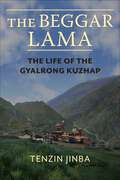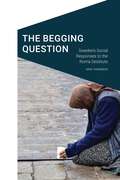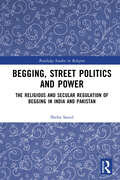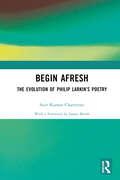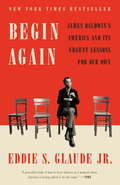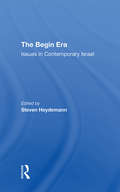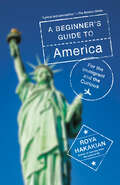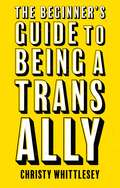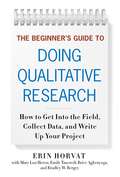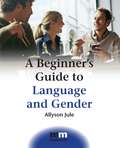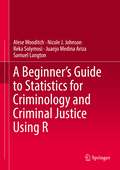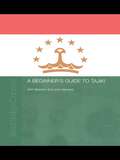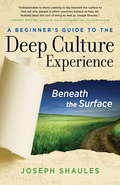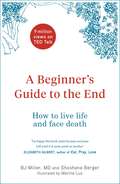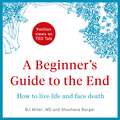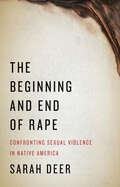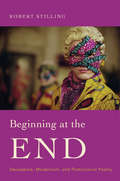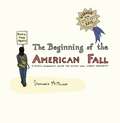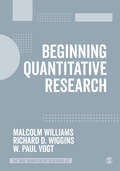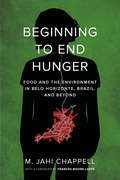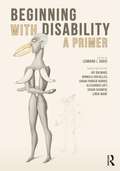- Table View
- List View
Befristete Beschäftigungsverhältnisse junger Erwachsener: Folgen für Partnerschaft und private Zukunftsgestaltung (Familienforschung)
by Daniel BaronIn den vergangenen drei Jahrzehnten sind die Anteile befristeter Beschäftigungsverhältnisse bei jungen Erwachsenen in der Bundesrepublik Deutschland und in anderen spätkapitalistischen Gesellschaften deutlich angestiegen. Eingebettet in fortdauernde Trends einer Verringerung wohlfahrtsstaatlicher Sicherungsstandards hat diese Entwicklung dazu beigetragen, dass sich Übergänge in stabile berufliche Karrieren und planbare private Zukunftsgestaltungen diversifizieren und verzögern. In der vorliegenden Studie wird eine soziologische Erklärung der Auswirkungen befristeter Beschäftigung auf private und partnerschaftliche Zukunftsgestaltungen von jungen Erwachsenen theoriegeleitet ausgearbeitet und empirisch überprüft. Da mit der Ausweitung befristeter Beschäftigung das klassische männliche Ernährermodell in Begründungsnot gerät, so die zentrale These, werden Neuaushandlungen von Geschlechterrollenarrangements in jungen Partnerschaften erforderlich. Nicht allein sozioökonomische Risiken im Kontext befristeter Beschäftigung, auch die sich wandelnden geschlechter- und erwerbsbezogenen Rollenerwartungen wirken sich verzögernd auf private und partnerschaftliche Zukunftsgestaltungen aus.Die Studie richtet sich an Forschende, Lehrende und Studierende der Soziologie, Politikwissenschaft, Psychologie und in benachbarten sozialwissenschaftlichen Disziplinen. Ebenso adressiert sie methodisch versierte Praktiker*
The Beggar Lama: The Life of the Gyalrong Kuzhap
by Jinba TenzinThe Beggar Lama is the story of the Gyalrong Kuzhap, a Tibetan Buddhist polymath and reincarnated lama who has led a remarkable life through the vicissitudes of the twentieth century. Born in 1930 in Tsanlha, Gyalrong, on the easternmost fringes of the Himalayan-Tibetan Plateau, he would go on to become a monk, a Communist official, a professor of Tibetan studies, and a leader in the Tibetan cultural survival movement in China.Drawing on hundreds of hours of in-depth and open-ended conversations over more than a decade, Tenzin Jinba presents the Gyalrong Kuzhap’s life story. The Beggar Lama chronicles his journeys—from Gyalrong to Lhasa, from steadfast Communist to critic of the Chinese regime, from scholar to activist—painting a compelling portrait of an influential and unconventional figure. In so doing, the book shows how the Gyalrong Kuzhap’s tale intertwines with larger social and political developments, providing a wide-ranging history of Tibet, the Sino-Tibetan borderlands, and China over the past century.The Beggar Lama shares the Gyalrong Kuzhap’s insightful and often critical views on Tibetan cultural and religious institutions, the Chinese Communist Party’s social and political agendas, Tibetan studies in China, and the prospects for Tibetan cultural rebirth. Above all, it is a story of hope in dark times, as the Gyalrong Kuzhap seeks with his “last breath” to prevent Tibetan culture and memory from vanishing.
The Begging Question: Sweden's Social Responses to the Roma Destitute (Cultural Geographies + Rewriting the Earth)
by Erik HanssonBegging, thought to be an inherently un-Swedish phenomenon, became a national fixture in the 2010s as homeless Romanian and Bulgarian Roma EU citizens arrived in Sweden seeking economic opportunity. People without shelter were forced to use public spaces as their private space, disturbing aesthetic and normative orders, creating anxiety among Swedish subjects and resulting in hate crimes and everyday racism. Parallel with Europe&’s refugee crisis in the 2010s, the &“begging question&” peaked. The presence of the media&’s so-called EU migrants caused a crisis in Swedish society along political, juridical, moral, and social lines due to the contradiction embodied in the Swedish authorities&’ denial of social support to them while simultaneously seeking to maintain the nation&’s image as promoting welfare, equality, and antiracism. In The Begging Question Erik Hansson argues that the material configurations of capitalism and class society are not only racialized but also unconsciously invested with collective anxieties and desires. By focusing on Swedish society&’s response to the begging question, Hansson provides insight into the dialectics of racism. He shrewdly deploys Marxian economics and Lacanian psychoanalysis to explain how it became possible to do what once was thought impossible: criminalize begging and make fascism politically mainstream, in Sweden. What Hansson reveals is not just an insight into one of the most captivating countries on earth but also a timely glimpse into what it means to be human.
Begging, Street Politics and Power: The Religious and Secular Regulation of Begging in India and Pakistan (Routledge Studies in Religion)
by Sheba SaeedBegging, Street Politics and Power explores the complex phenomenon of begging in the context of two different religions and societies in South Asia. Focusing on India and Pakistan, the book provides an in-depth examination of the religious and secular laws regulating begging along with discussion of the power dynamics involved. Drawing on textual analysis and qualitative field research, the chapters consider the notion of charity within Hinduism and Islam, the transaction of giving and receiving, and the political structures at play in the locations studied. The book engages with the conflicting compassionate and criminal sides of begging and reveals some of the commonalities and differences in religion and society within South Asia. It will be of interest to scholars working across the fields of religious studies, social science, law and Asian studies.
Begin Afresh: The Evolution of Philip Larkin’s Poetry
by Sisir Kumar ChatterjeeBegin Afresh: The Evolution of Philip Larkin’s Poetry offers incisive, insightful and yet lucid analyses of all the individual poems contained in the four major collections of Larkin (1922–1985).It also deals with his “Juvenile Poems”, Brunette Coleman poems, those in In the Grip of Light and XX Poems, as well as his last poems. The book also discusses Larkin’s novels and débats. It evaluates the critical opinions regarding various aspects of Larkin’s poetry, especially the issue of its development, and shows that it may not follow a clearly identifiable, linear, chronological line of evolution, but it does evolve in a subtle way from one phase of his career to the next. The book explores how Larkin discovered his own original, inimitable, idiosyncratic poetic voice by truly democratising English poetry for the first time, by writing accessible and pleasurable poetry, and by forging a new poetic out of a philistine aesthetic, which stands out as an artistic holotype. It shows how Larkin restores the relation between poetry and the reading public, a relation which was broken down by Modernist poets. It also establishes how his poetic vision is neither optimistic nor pessimistic, but realistic in that it “preserves” the universal human condition without moralising or philosophising. The book aims to make a fresh departure in Larkin criticism and mark a new era in Larkin studies. This volume will be of interest to students and researchers of Modernism, twentieth-century literature, poetry, language and literature.
Begin Again: James Baldwin's America and Its Urgent Lessons for Our Own
by Eddie S. GlaudeJames Baldwin grew disillusioned by the failure of the civil rights movement to force America to confront its lies about race. In our own moment, when that confrontation feels more urgently needed than ever, what can we learn from his struggle? <P><P>We live, according to Eddie S. Glaude Jr., in a moment when the struggles of Black Lives Matter and the attempt to achieve a new America have been challenged by the election of Donald Trump, a president whose victory represents yet another failure of America to face the lies it tells itself about race. From Charlottesville to the policies of child separation at the border, his administration turned its back on the promise of Obama’s presidency and refused to embrace a vision of the country shorn of the insidious belief that white people matter more than others. <P><P> We have been here before: For James Baldwin, these after times came in the wake of the civil rights movement, when a similar attempt to compel a national confrontation with the truth was answered with the murders of Medgar Evers, Malcolm X, and Martin Luther King, Jr. In these years, spanning from the publication of The Fire Next Time in 1963 to that of No Name in the Street in 1972, Baldwin transformed into a more overtly political writer, a change that came at great professional and personal cost. But from that journey, Baldwin emerged with a sense of renewed purpose about the necessity of pushing forward in the face of disillusionment and despair. <P><P>In the story of Baldwin’s crucible, Glaude suggests, we can find hope and guidance through our own after times, this Trumpian era of shattered promises and white retrenchment. Mixing biography—drawn partially from newly uncovered interviews—with history, memoir, and trenchant analysis of our current moment, Begin Again is Glaude&’s endeavor, following Baldwin, to bear witness to the difficult truth of race in America today. It is at once a searing exploration that lays bare the tangled web of race, trauma, and memory, and a powerful interrogation of what we all must ask of ourselves in order to call forth a new America. <P><P><b>A New York Times Bestseller</b>
The Begin Era: Issues In Contemporary Israel
by Steven Heydemann Jean NewsomThe years of Menachem Begin's leadership were among the most turbulent in Israeli history. Domestically, the preeminence of the Labor Alignment was successfully challenged, the Likud government failed to reduce Israel's high inflation rate, military and security expenditures reached new highs, and the politicization of economic policy increased. Internationally, although Israel's policy toward the occupied territories and its regional strategy were the focus of domestic and international debate, Begin's policies--departures from earlier norms--did successfully define Israel's foreign policy agenda, and his outlook is likely to continue to influence policy considerations. The contributors to this volume explore how Israel changed under Begin, the source of those changes, and how Israel is likely to evolve in a post-Begin era.
A Beginner's Guide to America: For the Immigrant and the Curious
by Roya HakakianA stirring, witty, and poignant glimpse into the bewildering American immigrant experience from someone who has lived it. Also, a mirror held up to America.Into the maelstrom of unprecedented contemporary debates about immigrants in the United States, this perfectly timed book gives us a portrait of what the new immigrant experience in America is really like. Written as a "guide" for the newly arrived, and providing "practical information and advice," Roya Hakakian, an immigrant herself, reveals what those who settle here love about the country, what they miss about their homes, the cruelty of some Americans, and the unceasing generosity of others. She captures the texture of life in a new place in all its complexity, laying bare both its beauty and its darkness as she discusses race, sex, love, death, consumerism, and what it is like to be from a country that is in America's crosshairs. Her tenderly perceptive and surprisingly humorous account invites us to see ourselves as we appear to others, making it possible for us to rediscover our many American gifts through the perspective of the outsider. In shattering myths and embracing painful contradictions that are unique to this place, A Beginner's Guide to America is Hakakian's candid love letter to America.
The Beginner's Guide to Being A Trans Ally
by Christy WhittleseyWhat does cisgender mean? What are people saying when they refer to "assigned" gender? Why is it not OK to say 'preferred pronouns'? What is cis privilege? If you're curious about the answers to these questions and want to learn more, this book is for you.This easy-to-read guide offers information and advice to anyone wanting to understand more about trans experiences. It explains what gender identity is and arms you with the correct terminology to use. Filled with real-life examples and FAQs, it offers helpful strategies to navigate respectful conversations, speak up against transphobia and create inclusive relationships and spaces. It's the ideal tool for anyone wanting to become a better ally to transgender and/or nonbinary people.
The Beginner's Guide to Doing Qualitative Research
by Erin Horvat Mary Lou Heron Emily Tancredi-Brice Agbenyega Bradley W. BergeyDesigned for aspiring ethnographers and qualitative researchers, this book is organized into three parts that addresses the key phases of any ethnographic project: beginning a project, collecting data in the field, and analysing data and writing about your study.
A Beginner's Guide to Language and Gender
by Allyson JuleA Beginner's Guide to Language and Gender offers a broad and accessible introduction to the study of gender and language use for those new to the subject. The book introduces the theoretical and practical perspectives, including relevant frameworks necessary to understand ways in which language interacts with gender/sex in various settings, including: in media, in schools, in places of business, in places of worship, and at home.
A Beginner’s Guide to Statistics for Criminology and Criminal Justice Using R
by Alese Wooditch Nicole J. Johnson Reka Solymosi Juanjo Medina Ariza Samuel LangtonThis book provides hands-on guidance for researchers and practitioners in criminal justice and criminology to perform statistical analyses and data visualization in the free and open-source software R. It offers a step-by-step guide for beginners to become familiar with the RStudio platform and tidyverse set of packages. This volume will help users master the fundamentals of the R programming language, providing tutorials in each chapter that lay out research questions and hypotheses centering around a real criminal justice dataset, such as data from the National Survey on Drug Use and Health, National Crime Victimization Survey, Youth Risk Behavior Surveillance System, The Monitoring the Future Study, and The National Youth Survey. Users will also learn how to manipulate common sources of agency data, such as calls-for-service (CFS) data. The end of each chapter includes exercises that reinforce the R tutorial examples, designed to help master the software as well as to provide practice on statistical concepts, data analysis, and interpretation of results. The text can be used as a stand-alone guide to learning R or it can be used as a companion guide to an introductory statistics textbook, such as Basic Statistics in Criminal Justice (2020).
A Beginners' Guide to Tajiki
by Azim Baizoyev John HaywardThis is a conversational approach to the teaching and learning of the Tajiki language. It uses authentic language material to help learners as they proceed through its topic-based lessons. Its emphasis on the spoken language promotes oral fluency alongside written skills. Both lessons and appendices present new vocabulary and grammar simply and recycle material to provide opportunities for both controlled and free language learning.The appendices include not only lists of useful information and samples of commonly needed letters and speeches but also an invaluable introduction to Tajiki grammar and a comprehensive Tajiki-English dictionary of all the book's vocabulary - over 4500 definitions.
A Beginner's Guide to the Deep Culture Experience: Beneath the Surface
by Joseph ShaulesWhen we leave and travel abroad, for pleasure or for business, we make a choice: to have a superficial “airport experience” at our destination, or to appreciate the hidden culture beneath the surface. A Beginner’s Guide to the Deep Culture Experience proposes a deep culture journey, encouraging travelers to pursue a meaningful cross-cultural experience. Sharing anthropologist Edward Hall’s conviction that becoming aware of our unconscious cultural programming is a transcendental challenge facing us all, author Joseph Shaules shows how the “deep culture experience” can teach us about ourselves. This practical book is an accessible introduction to intercultural communication without buzz words, theory or abstraction. If you travel internationally for work or simply enjoy the diverse cultures of the world, read this inspirational book before your next trip.
A Beginner's Guide to the End: How to Live Life to the Full and Die a Good Death
by BJ Miller Shoshana Berger"I wish I'd had this book when I needed it. Death and dying are not subjects that many people are comfortable talking about, but it's hugely important to be as prepared as you can be - emotionally, physically, practically, financially, and spiritually. This book may be the most important guide you could have." - Elizabeth Gilbert, author of Eat Pray Love ___________The end of a life can often feel like a traumatic, chaotic and inhuman experience. In this reassuring and inspiring book, palliative care physician Dr BJ Miller and writer Shoshana Berger provide a vision for rethinking and navigating this universal process. There are plenty of self-help books for mourners, but nothing in the way of a modern, approachable and above all useful field guide for the living. And all of us - young, old, sick and well - could use the help. After all, pregnant couples have ample resources available to them as they prepare to bring a new life into the world: Lamaze courses, elaborate birth plans, tons of manuals. Why don't we have a What to Expect When You're Expecting to Die book?An accessible, beautifully designed and illustrated companion, A Beginner's Guide to the End offers a clear-eyed and compassionate survey of the most pressing issues that come up when one is dying, and will bring optimism and practical guidance to empower readers with the knowledge, resources and tools they'll need to die better, maybe even with triumph.
A Beginner's Guide to the End: How to Live Life to the Full and Die a Good Death
by BJ Miller Shoshana Berger"I wish I'd had this book when I needed it. Death and dying are not subjects that many people are comfortable talking about, but it's hugely important to be as prepared as you can be - emotionally, physically, practically, financially, and spiritually. This book may be the most important guide you could have." - Elizabeth Gilbert, author of Eat Pray Love ___________The end of a life can often feel like a traumatic, chaotic and inhuman experience. In this reassuring and inspiring book, palliative care physician Dr BJ Miller and writer Shoshana Berger provide a vision for rethinking and navigating this universal process. There are plenty of self-help books for mourners, but nothing in the way of a modern, approachable and above all useful field guide for the living. And all of us - young, old, sick and well - could use the help. After all, pregnant couples have ample resources available to them as they prepare to bring a new life into the world: Lamaze courses, elaborate birth plans, tons of manuals. Why don't we have a What to Expect When You're Expecting to Die book?An accessible, beautifully designed and illustrated companion, A Beginner's Guide to the End offers a clear-eyed and compassionate survey of the most pressing issues that come up when one is dying, and will bring optimism and practical guidance to empower readers with the knowledge, resources and tools they'll need to die better, maybe even with triumph. (P) 2019 Simon & Schuster
The Beginning and End of Rape: Confronting Sexual Violence in Native America
by Sarah DeerWinner of the Labriola Center American Indian National Book Award Despite what major media sources say, violence against Native women is not an epidemic. An epidemic is biological and blameless. Violence against Native women is historical and political, bounded by oppression and colonial violence. This book, like all of Sarah Deer&’s work, is aimed at engaging the problem head-on—and ending it.The Beginning and End of Rape collects and expands the powerful writings in which Deer, who played a crucial role in the reauthorization of the Violence Against Women Act in 2013, has advocated for cultural and legal reforms to protect Native women from endemic sexual violence and abuse. Deer provides a clear historical overview of rape and sex trafficking in North America, paying particular attention to the gendered legacy of colonialism in tribal nations—a truth largely overlooked or minimized by Native and non-Native observers. She faces this legacy directly, articulating strategies for Native communities and tribal nations seeking redress. In a damning critique of federal law that has accommodated rape by destroying tribal legal systems, she describes how tribal self-determination efforts of the twenty-first century can be leveraged to eradicate violence against women. Her work bridges the gap between Indian law and feminist thinking by explaining how intersectional approaches are vital to addressing the rape of Native women.Grounded in historical, cultural, and legal realities, both Native and non-Native, these essays point to the possibility of actual and positive change in a world where Native women are systematically undervalued, left unprotected, and hurt. Deer draws on her extensive experiences in advocacy and activism to present specific, practical recommendations and plans of action for making the world safer for all.
Beginning at the End: Decadence, Modernism, and Postcolonial Poetry
by Robert Stilling StillingDuring the struggle for decolonization, Frantz Fanon argued that artists who mimicked European aestheticism were “beginning at the end,” skipping the inventive phase of youth for a decadence thought more typical of Europe’s declining empires. Robert Stilling takes up Fanon’s assertion to argue that decadence became a key idea in postcolonial thought, describing both the failures of revolutionary nationalism and the assertion of new cosmopolitan ideas about poetry and art. In Stilling’s account, anglophone postcolonial artists have reshaped modernist forms associated with the idea of art for art’s sake and often condemned as decadent. By reading decadent works by J. K. Huysmans, Walter Pater, Henry James, and Oscar Wilde alongside Chinua Achebe, Derek Walcott, Agha Shahid Ali, Derek Mahon, Yinka Shonibare, Wole Soyinka, and Bernardine Evaristo, Stilling shows how postcolonial artists reimagined the politics of aestheticism in the service of anticolonial critique. He also shows how fin de siècle figures such as Wilde questioned the imperial ideologies of their own era. Like their European counterparts, postcolonial artists have had to negotiate between the imaginative demands of art and the pressure to conform to a revolutionary politics seemingly inseparable from realism. Beginning at the End argues that both groups—European decadents and postcolonial artists—maintained commitments to artifice while fostering oppositional politics. It asks that we recognize what aestheticism has contributed to politically engaged postcolonial literature. At the same time, Stilling breaks down the boundaries around decadent literature, taking it outside of Europe and emphasizing the global reach of its imaginative transgressions.
The Beginning of the American Fall: A Comics Journalist Inside the Occupy Wall Street Movement
by Stephanie McmillanCan a cartoonist and millions of random strangers change the world? The initial stages of their attempt are chronicled in this book of comics-journalism and written observations. Stephanie McMillan, long-time activist and cartoonist, has waited her entire life for the American people to rise up. Sparked by uprisings around the world, a new movement bursts onto the national scene against a system that denies the people a decent life and puts the planet at risk. With delightful full-color drawings, interviews, dialogue, description, and insightful reflections, this book chronicles the first several months of the fragile and contradictory movement. It situates detailed personal experiences and representative narratives within the broad context of a truly unique and historical global conjuncture. This book will stand as a record of the emerging movement in accessible comics form.
Beginning Quantitative Research (The SAGE Quantitative Research Kit)
by Malcolm Williams Richard D. Wiggins W.P. VogtThis concise text provides a clear and digestible introduction to completing quantitative research. Taking you step-by-step through the process of completing your quantitative research project, it offers guidance on: · Formulating your research question · Completing literature reviews and meta-analysis · Formulating a research design and specifying your target population and data source · Choosing an appropriate method and analysing your findings Part of The SAGE Quantitative Research Kit, this book will give you the know-how and confidence needed to succeed on your quantitative research journey.
Beginning Quantitative Research (The SAGE Quantitative Research Kit)
by Malcolm Williams Richard D. Wiggins W.P. VogtThis concise text provides a clear and digestible introduction to completing quantitative research. Taking you step-by-step through the process of completing your quantitative research project, it offers guidance on: · Formulating your research question · Completing literature reviews and meta-analysis · Formulating a research design and specifying your target population and data source · Choosing an appropriate method and analysing your findings Part of The SAGE Quantitative Research Kit, this book will give you the know-how and confidence needed to succeed on your quantitative research journey.
Beginning Statistics
by Sir Ian Diamond Julie Jefferies`The clarity, simplicity and use of many practical examples makes this book very useful, primarily for under- and postgraduate students' - Journal of Biosocial Science With an emphasis on description, examples, graphs and displays rather than statistical formulae, this book is the ideal introductory guide for students across the social sciences. It shows how all students can understand the basic ideas of statistics at a level appropriate with being a good social scientist. The authors explain the right ways to present data, how to describe a set of data using summary statistics and how to infer what is going on in a population when all you have to go on is the sample. The book uses small data sets to help students understand the basic principles, and no mathematics or statistical background is assumed.
Beginning to End Hunger: Food and the Environment in Belo Horizonte, Brazil, and Beyond
by M. Jahi ChappellBeginning to End Hunger presents the story of Belo Horizonte, home to 2.5 million people and the site of one of the world’s most successful food security programs. Since its Municipal Secretariat of Food and Nutritional Security was founded in 1993, Belo Horizonte has sharply reduced malnutrition, leading it to serve as an inspiration for Brazil’s renowned Zero Hunger programs. The secretariat’s work with local family farmers shows how food security, rural livelihoods, and healthy ecosystems can be supported together. In this convincing case study, M. Jahi Chappell establishes the importance of holistic approaches to food security, suggests how to design successful policies to end hunger, and lays out strategies for enacting policy change. With these tools, we can take the next steps toward achieving similar reductions in hunger and food insecurity elsewhere in the developed and developing worlds.
Beginning to See the Light: Sex, Hope, and Rock-and-Roll
by Ellen WillisFrom the New Yorker&’s inimitable first pop music critic comes this pioneering collection of essays by a conscientious writer whose political realm is both radical and rational, and whose prime preoccupations are with rock &’n&’ roll, sexuality, and above all, freedom. Here Ellen Willis assuredly captures the thrill of music, the disdain of authoritarian culture, and the rebellious spirit of the &’60s and &’70s.
Beginning With Disability: A Primer
by Lennard DavisWhile there are many introductions to disability and disability studies, most presume an advanced academic knowledge of a range of subjects. In Beginning with Disability, Lennard Davis has put together the first introductory reader for disability studies aimed at first- and second-year students in two- and four-year colleges. This volume of essays across disciplines including education, sociology, communications, psychology, social sciences, and humanities features accessible, readable, and relatively short articles that do not require specialized knowledge. Lennard Davis, along with a team of consulting editors, has put together feature a number of blogs, vlogs, and other videos to make the materials more direct and vivid to students. The text includes a section called "Subject to Debate" that features short pro and con pieces on controversial subjects that can be debated in class or act as prompts for assignments.

